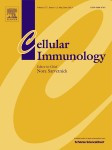Neuwirth A, Dobeš J, Oujezdská J, Ballek O, Benešová M, Sumník Z, Včeláková J, Koloušková S, Obermannová B, Kolář M, Stechová K, Filipp D. Cell Immunol. 2012 273(2):158–63. Epub 2012 Jan 2. IF: 2.575

Department of Paediatrics
Abstract
Type 1 diabetes (T1D) is an autoimmune disease caused by T-cell mediated destruction of pancreatic beta cells. Recently, small cationic α-defensin molecules have been implicated in the pathogenesis of certain inflammatory and autoimmune diseases. The purpose of this study was to assess the α-defensin expression in patients with T1D and elucidate the cellular source of their production. Our results show that 30% of patients exhibit increased levels of α-defensin mRNAs in their capillary blood. Quantitative RT-PCR performed on FACS-sorted granulocytes identified CD15(dull)/CD14(weak) population as the cellular source of α-defensins. Surprisingly, this granulocyte subpopulation displayed augmentation of α-defensin expression in all T1D patients tested. The determination of cell surface markers, expression of cell-specific genes and confocal microscopy identified CD15(dull)/CD14(weak) cells as eosinophils. The presence of transcriptionally active eosinophils in diabetic patients suggests that eosinophils could be a part of an intricate innate immune cellular network involved in the development of diabetes.
-mk-
